Where is the Stock Market Santa Rally?
Stock-Markets / Financial Markets 2009 Dec 12, 2009 - 01:51 AM GMT Dems want to raise the debt ceiling now rather than face a backlash in 2010.
Dems want to raise the debt ceiling now rather than face a backlash in 2010.
In a bold but risky year-end strategy, Democrats are preparing to raise the federal debt ceiling by as much as $1.8 trillion before New Year’s rather than have to face the issue again prior to the 2010 elections.
“We’ve incurred this debt. We have to pay our bills,” House Majority Leader Steny Hoyer told POLITICO Wednesday. And the Maryland Democrat confirmed that the anticipated increase could be as high as $1.8 trillion — nearly twice what had been assumed in last spring’s budget resolution for the 2010 fiscal year.
The leadership is betting that it’s better for the party to take its lumps now rather than risk further votes over the coming year. But the enormity of the number could create its own dynamic, much as another debt ceiling fight in 1985 gave rise to the Gramm-Rudman deficit reduction act mandating across-the-board spending cuts nearly 25 years ago.
Tracking the Government’s flawed Household Net Worth Figures.
-The key finding is that the government has been chronically overstating Household Net Worth in original publications, and subsequently revising the data dramatically in order to hide the fact that consumers' wealth is nowhere near as impressive as originally represented. Putting a number to this statement: a $2.1 trillion downward revision in just one quarter.
Where is the Santa Rally?
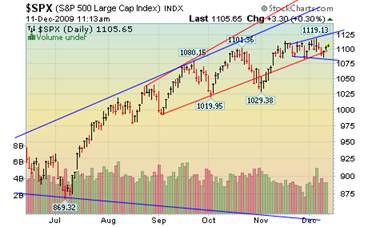 -- Stocks are beginning to struggle, even as the Santa Rally is being hyped by investment newsletters. The fact is that the major indices are all in a little-known trading pattern called the broadening (megaphone) top. For those of you who are technophiles, the full description may be found in Edwards & Magee’s Technical Analysis of Stock Trends, (pp. 151-154) where they describe the Orthodox Broadening Top. This pattern, which has only rarely been seen since the 1929 market top has made a reappearance in the S&P 500 index. A cautionary note, to say the least.
-- Stocks are beginning to struggle, even as the Santa Rally is being hyped by investment newsletters. The fact is that the major indices are all in a little-known trading pattern called the broadening (megaphone) top. For those of you who are technophiles, the full description may be found in Edwards & Magee’s Technical Analysis of Stock Trends, (pp. 151-154) where they describe the Orthodox Broadening Top. This pattern, which has only rarely been seen since the 1929 market top has made a reappearance in the S&P 500 index. A cautionary note, to say the least.
Treasury bonds and “good news” don’t mix.
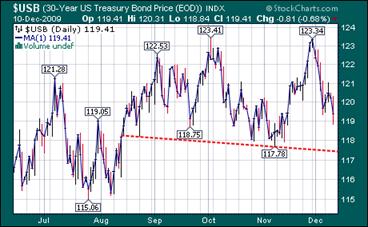 -- Treasuries fell, with 10-year notes yields touching the highest levels since August, as reports showed U.S. retail sales and consumer confidence rose more than forecast. Ten-year notes headed for a second week of declines after the U.S. yesterday completed the last of this week’s three note and bond auctions totaling $74 billion. The difference in yield between 2-and 30-year securities widened yesterday to the most since at least 1980 as investors bet the Federal Reserve will keep interest rates lower for longer while the government sells more longer-maturity debt.
-- Treasuries fell, with 10-year notes yields touching the highest levels since August, as reports showed U.S. retail sales and consumer confidence rose more than forecast. Ten-year notes headed for a second week of declines after the U.S. yesterday completed the last of this week’s three note and bond auctions totaling $74 billion. The difference in yield between 2-and 30-year securities widened yesterday to the most since at least 1980 as investors bet the Federal Reserve will keep interest rates lower for longer while the government sells more longer-maturity debt.
Gold approaches an important trendline.
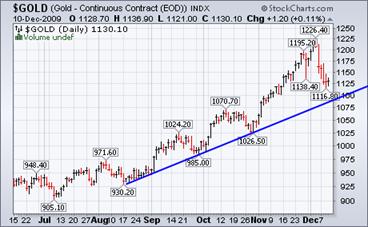 -- Gold futures fell Friday to extend their weekly losses, as upbeat retail and consumer sentiment data pushed the U.S. dollar sharply higher, curbing gold's appeal as a safe asset and as a hedge against a weaker greenback. Gold for December delivery fell $6.30, or 0.6%, at $1,119.40 an ounce on the Comex division of the New York Mercantile Exchange. The contract is set to decline more than 4% this week.
-- Gold futures fell Friday to extend their weekly losses, as upbeat retail and consumer sentiment data pushed the U.S. dollar sharply higher, curbing gold's appeal as a safe asset and as a hedge against a weaker greenback. Gold for December delivery fell $6.30, or 0.6%, at $1,119.40 an ounce on the Comex division of the New York Mercantile Exchange. The contract is set to decline more than 4% this week.
The Japanese market isn’t out of the woods yet.
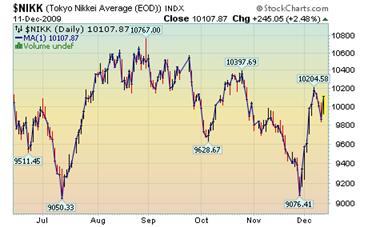 -- Japanese stocks rose for the first time in four days, sending the Nikkei 225 Stock Average to a weekly gain, as reductions in U.S. jobless claims boosted confidence that an economic expansion is increasing and brokerages lifted ratings.
-- Japanese stocks rose for the first time in four days, sending the Nikkei 225 Stock Average to a weekly gain, as reductions in U.S. jobless claims boosted confidence that an economic expansion is increasing and brokerages lifted ratings.
Although the rally took back nearly 70% of the losses suffered earlier this week, it is not yet out of the woods.
The Shanghai index unable to regain “high ground”.
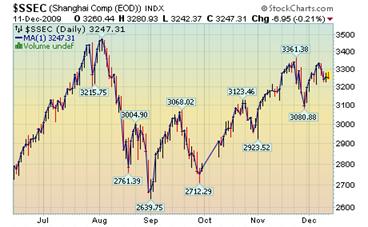 -- The Shanghai Composite Index fell 0.2 percent, trimming this year’s gain to 78.4 percent, on concern that monetary policy may tighten. Asset bubbles could threaten the recovery and policy makers are on alert for inflation after yesterday’s data showed that consumer prices rose 0.6 percent from a year earlier, the first increase in 10 months. The inability to regain the old “high ground” is starting to tell on Shanghai’s performance.
-- The Shanghai Composite Index fell 0.2 percent, trimming this year’s gain to 78.4 percent, on concern that monetary policy may tighten. Asset bubbles could threaten the recovery and policy makers are on alert for inflation after yesterday’s data showed that consumer prices rose 0.6 percent from a year earlier, the first increase in 10 months. The inability to regain the old “high ground” is starting to tell on Shanghai’s performance.
The dollar has broken out of its downtrend.
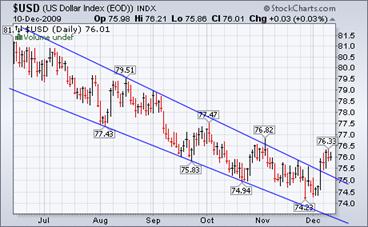 The dollar added to gains versus major currencies on Friday, pushing it to the highest in two months, after a marked uptick in consumer sentiment bolstered expectations of a U.S. economic recovery. The greenback reversed earlier losses after a government report showed U.S. retail sales jumped more than twice as much as expected, up 1.3% in November. The gains in the dollar after positive U.S. economic data show the currency is reasserting a relationship with interest-rate expectations, as the stronger economic data has analysts and investors considering the possibility that the Federal Reserve can raise its benchmark rate from record lows sooner than previously anticipated.
The dollar added to gains versus major currencies on Friday, pushing it to the highest in two months, after a marked uptick in consumer sentiment bolstered expectations of a U.S. economic recovery. The greenback reversed earlier losses after a government report showed U.S. retail sales jumped more than twice as much as expected, up 1.3% in November. The gains in the dollar after positive U.S. economic data show the currency is reasserting a relationship with interest-rate expectations, as the stronger economic data has analysts and investors considering the possibility that the Federal Reserve can raise its benchmark rate from record lows sooner than previously anticipated.
Don’t buy Ginnie Mae securities.
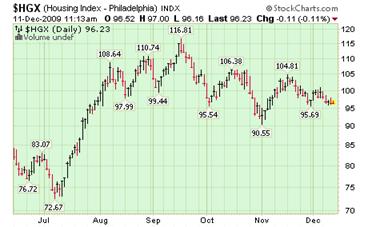 -- In November, Ginnie Mae's outside auditor reported a "significant deficiency" in Ginnie's internal controls. The agency could not adequately track whether loans sold to investors had been insured by the FHA and therefore met government requirements. The auditors noted they first identified the problem in 2007. Two years later and the problem isn’t fixed. Should you trust your money with them?
-- In November, Ginnie Mae's outside auditor reported a "significant deficiency" in Ginnie's internal controls. The agency could not adequately track whether loans sold to investors had been insured by the FHA and therefore met government requirements. The auditors noted they first identified the problem in 2007. Two years later and the problem isn’t fixed. Should you trust your money with them?
Is the EIA reporting old information?.
The Energy Information Agency weekly report suggests, “Although the emerging Asian economies were generally less exposed to financial risks and credit default arrangements than the U.S. and European economies, many of them have taken strong stimulus measures throughout 2009 that are expected to boost domestic demand, financial credit, and greater investment in transportation and infrastructure. Growth in oil demand will follow the increases in economic activity.”
NatGas prices are spiking again.
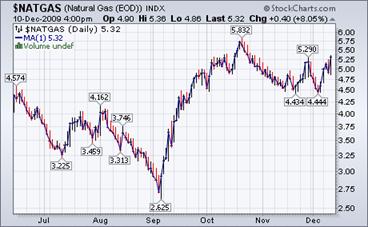 The Energy Information Agency’s Natural Gas Weekly Update reports, “Since last Wednesday, natural gas spot prices increased at all market locations in the lower 48 States, climbing to more than $5 per MMBtu. Increases ranged between 44 cents and $1.39 per MMBtu, and price increases for the county as a whole averaged 67 cents. The Henry Hub natural gas spot price rose above $5 per MMBtu for the first time since February 4, 2009, ending trading yesterday at $5.27 per MMBtu.
The Energy Information Agency’s Natural Gas Weekly Update reports, “Since last Wednesday, natural gas spot prices increased at all market locations in the lower 48 States, climbing to more than $5 per MMBtu. Increases ranged between 44 cents and $1.39 per MMBtu, and price increases for the county as a whole averaged 67 cents. The Henry Hub natural gas spot price rose above $5 per MMBtu for the first time since February 4, 2009, ending trading yesterday at $5.27 per MMBtu.
The Monster from Jekyll Island Revisited.
G. Edward Griffin explains the origin of the Federal Reserve in this series of videos. Take the time to watch them this weekend.
How did we get in this pickle?
The credit crunch continues, with businesses large and small finding that their bankers remain exceedingly stingy in the wake of the 2008 financial debacle. "We need to see banks making more loans to their business customers," Federal Deposit Insurance Corporation (FDIC) Chairwoman Sheila Bair told reporters recently after the FDIC released figures showing that the amount of loans outstanding in the nation's banks fell $210.4 billion in the third quarter of 2008. That is the largest quarterly decline since the FDIC began tracking loans in 1984.
On December 11, 1930…
Market wrap: Market sentiment unsettled by decline in face of favorable news from US Steel and NY Central (declared normal dividend). Observers advise “remaining on the side lines until the market indicated a tendency to move ahead again.”
Traders alert: The Practical Investor is currently offering four months of the daily Inner Circle Newsletter for the price of three to new subscribers. Contact us at tpi@thepracticalinvestor.com for a free sample newsletter and subscription information.
Our Investment Advisor Registration is on the Web
We are in the process of updating our website at www.thepracticalinvestor.com to have more information on our services. Log on and click on Advisor Registration to get more details.
If you are a client or wish to become one, please make an appointment to discuss our investment strategies by calling Connie or Tony at (517) 699-1554, ext 10 or 11. Or e-mail us at tpi@thepracticalinvestor.com .
Anthony M. Cherniawski,
President and CIO
http://www.thepracticalinvestor.com
As a State Registered Investment Advisor, The Practical Investor (TPI) manages private client investment portfolios using a proprietary investment strategy created by Chief Investment Officer Tony Cherniawski. Throughout 2000-01, when many investors felt the pain of double digit market losses, TPI successfully navigated the choppy investment waters, creating a profit for our private investment clients. With a focus on preserving assets and capitalizing on opportunities, TPI clients benefited greatly from the TPI strategies, allowing them to stay on track with their life goals
Disclaimer: The content in this article is written for educational and informational purposes only. There is no offer or recommendation to buy or sell any security and no information contained here should be interpreted or construed as investment advice. Do you own due diligence as the information in this article is the opinion of Anthony M. Cherniawski and subject to change without notice.
Anthony M. Cherniawski Archive |
© 2005-2022 http://www.MarketOracle.co.uk - The Market Oracle is a FREE Daily Financial Markets Analysis & Forecasting online publication.



